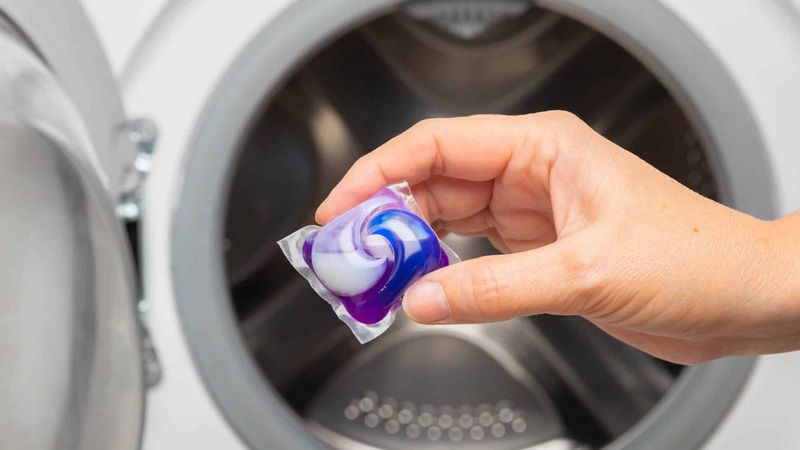Dongguan UFine Daily Chemical Co.,Ltd.
- All
- Product Name
- Product Keyword
- Product Model
- Product Summary
- Product Description
- Multi Field Search
Views: 222 Author: Tomorrow Publish Time: 10-21-2025 Origin: Site











Content Menu
● Understanding Laundry Pods and Their Scents
● How Scents in Laundry Pods Interact with the Skin
● Common Fragrance Allergens in Laundry Pods
● How Residue Amount and Fabric Type Affect Skin Exposure
● Factors Influencing Skin Sensitivity to Scented Laundry Pods
● Addressing Skin Reactions to Scented Laundry Pods
● Preventive Strategies for Using Scented Laundry Pods Safely
● Alternatives to Scented Laundry Pods for Sensitive Skin
● Emerging Research and Safety Regulations
● FAQ
>> 1. Can scented laundry pods cause allergic skin reactions?
>> 2. How can I tell if my skin is reacting to scented laundry pods?
>> 3. Are unscented laundry pods safer for sensitive skin?
>> 4. Does washing clothes thoroughly remove fragrance residue?
>> 5. What should I do if I develop a skin reaction from laundry pods?
Laundry pods have become a staple in many households due to their convenience and efficiency. These small, pre-measured packets contain concentrated detergents and often include added scents to leave clothes smelling fresh. However, questions have arisen about how the scents in laundry pods might affect the skin, especially for individuals with allergies, sensitivities, or skin conditions. This article explores the impact of scented laundry pods on the skin, the potential risks, mechanisms behind skin reactions, and ways to minimize adverse effects.

Laundry pods are designed to deliver detergent, stain removers, fabric softeners, and fragrances in one compact package. The scented variety contains fragrance compounds, which can be synthetic or natural. These fragrances are added to provide a pleasant smell to cleaned garments but may contain chemicals that can irritate the skin.
Fragrance compounds in pods often consist of a blend of essential oils, aroma chemicals, and carrier substances. While many consumers enjoy this fresh scent, these ingredients are a common cause of allergic and irritant contact dermatitis.
Many scented detergent pods incorporate strong fragrance blends because the scent competes with other odors such as smoke, sweat, or food spills. As a result, the chemical complexity of these fragrances increases the risk of skin exposure to multiple potential allergens with each wash cycle.
When clothes washed with scented laundry pods are worn, fragrance residues may remain on the fabric, directly contacting the skin. This skin contact can lead to various reactions depending on the individual's sensitivity and the chemical composition of the fragrance.
- Irritant Contact Dermatitis: This is the most common reaction caused by direct damage to the skin barrier. It occurs when the skin is exposed to harsh chemicals or excessive amounts of detergent residue. Symptoms usually include redness, burning, itching, and sometimes peeling or scaling.
- Allergic Contact Dermatitis: This is an immune-mediated response. It happens in individuals sensitized to specific fragrance allergens from the laundry pod residues. Upon re-exposure, the immune system overreacts, causing inflammation, itchiness, swelling, rash, and blisters.
- Photosensitivity: Some fragrance chemicals can make the skin more reactive to sunlight (phototoxicity or photoallergy). This can worsen sunburn or cause uneven pigmentation after sun exposure.
- Exacerbation of Existing Skin Conditions: People with pre-existing skin conditions such as eczema, psoriasis, or rosacea may notice flare-ups following exposure to scented residues due to already impaired skin barriers.
The fragrance industry uses many chemicals, but only some are known allergens. Key fragrance allergens found in laundry pods include:
- Limonene and Linalool: These natural terpenes are common in citrus and floral scents but can oxidize upon air exposure, increasing allergenic potential.
- Benzyl Alcohol: Used as a preservative and fragrance ingredient that can irritate or sensitize the skin.
- Citral and Geraniol: Found in lemon and rose oils, these compounds are frequent causes of allergic reactions.
- Eugenol: Present in clove oil and used for its spicy aroma, eugenol is a known sensitizer.
Such allergens can persist on fabrics if washing and rinsing are incomplete, increasing the risk of skin contact.
The nature of the fabric itself, along with the amount of detergent residue left after washing, plays a significant role in how scents affect the skin. Synthetic fabrics like polyester and nylon can trap fragrance chemicals more than natural fibers like cotton. This prolonged retention may enhance skin contact time with potential irritants.
Pods that contain higher concentrations of fragrance or detergent ingredients can leave more residues if the washing machine's cycle or water volume isn't adequate. Residues embedded in clothing seams, tags, or elastic components also contribute to localized skin issues.

Several factors determine how strongly the scents in laundry pods affect an individual's skin:
- Skin Barrier Integrity: Healthy skin acts as a protective barrier against irritants. Conversely, dry, cracked, or damaged skin allows allergens to penetrate more easily, increasing sensitivity.
- Frequency of Contact: Continuous exposure to fragrance chemicals over days or weeks is more likely to produce sensitization and chronic dermatitis.
- Washing and Rinsing Practices: Incomplete rinsing leaves more detergent and fragrance residues, escalating the risk of irritation.
- Personal Allergies or Sensitivities: Some people have genetic predispositions that make them more vulnerable to fragrance allergies.
- Environmental Factors: Humidity, temperature, and additional skin stressors like harsh soaps or fabrics can worsen reactions.
If irritation or allergy symptoms develop after using scented pods, it's important to take immediate and effective measures:
- Cease using scented pods and switch to fragrance-free or hypoallergenic laundry products.
- Wash irritated areas gently and avoid scratching to prevent secondary infections.
- Apply moisturizing creams to restore and protect the skin barrier.
- Consider topical corticosteroids or anti-itch medications if advised by a healthcare professional.
- Avoid tight or synthetic clothing that traps heat and moisture, worsening skin irritation.
- Use distilled water or perform an extra rinse cycle during laundry to reduce residues.
Preventing skin problems related to scented laundry pods is achievable with simple lifestyle adjustments:
- Choose Pods Wisely: Look for products labeled “dermatologist tested,” “fragrance-free,” or “sensitive skin.” Some brands deliberately formulate pods without common allergens.
- Reduce Contact Time: Wash new clothes multiple times before wearing them to remove excess fragrance and chemicals.
- Optimize Washing Habits: Use warm water, longer rinse cycles, and appropriate detergent amounts to minimize residue.
- Wear Barrier Layers: Soft cotton undershirts can reduce skin exposure to treated outer garments.
- Patch Test New Products: When trying a new laundry pod, wash a small piece of fabric and test it on your forearm over 24-48 hours.
For those who experience frequent skin problems, multiple alternatives can provide effective cleaning without fragrance risks:
- Liquid or powder detergents marked fragrance-free.
- Traditional soap nuts or natural soap flakes.
- Non-scented fabric softeners or commercial odor neutralizers.
- Homemade laundry boosters like baking soda or white vinegar as add-ons for deodorizing.
- Eau de toilette or light personal fragrances applied to skin, avoiding laundry scents altogether.
While routine household products pose low risk to most users, research continues into how fragrances impact skin in vulnerable populations. Regulatory bodies such as the European Chemicals Agency (ECHA) and the U.S. Environmental Protection Agency (EPA) monitor and regulate fragrance allergens, enforcing labeling requirements for common sensitizers.
The fragrance industry is innovating, producing pods with reduced allergenic fragrance blends and encouraging transparency in ingredient disclosure to help consumers make informed choices.
Scents in laundry pods can affect the skin, especially in individuals with sensitive skin or allergies. Fragrance chemicals may cause irritant or allergic contact dermatitis when residues remain on clothing. Several factors such as washing practices, fabric type, and individual susceptibility influence the risk and severity of skin reactions. To minimize risk, consumers should consider fragrance-free products, ensure thorough rinsing, avoid prolonged skin exposure to scented residues, and maintain strong skin barrier health. By understanding how scented laundry pods interact with the skin, users can enjoy fresh-smelling clothes without compromising skin comfort and safety.

Yes, fragrances in laundry pods can cause allergic contact dermatitis in sensitive individuals due to allergenic compounds like limonene and linalool.
Common signs include redness, itching, rash, dryness, and swelling on areas where washed clothes contact your skin.
Unscented or hypoallergenic pods generally reduce the risk of irritation and allergies because they avoid fragrance allergens.
Proper rinsing reduces detergent and fragrance residues, lowering the chance of skin irritation.
Stop using scented pods, switch to fragrance-free products, moisturize your skin, and consult a dermatologist if symptoms persist.